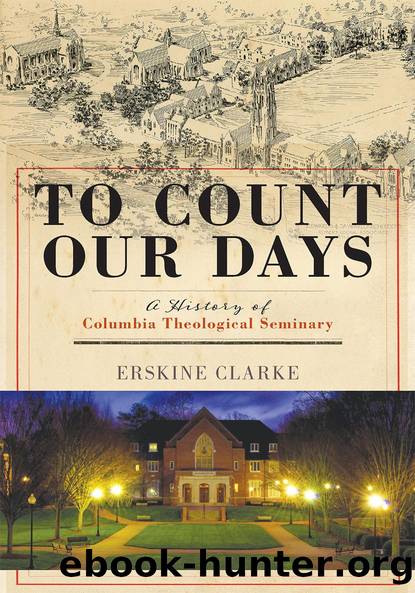To Count Our Days by Erskine Clarke

Author:Erskine Clarke [Clarke, Erskine]
Language: eng
Format: epub
Tags: Religion, Christian Theology, History
ISBN: 9781611179972
Google: N0mjDwAAQBAJ
Publisher: Univ of South Carolina Press
Published: 2019-08-16T02:51:22+00:00
13
Years of War and a Growing Prosperity
On Armistice Day, November 1940, McDowell Richards addressed the Atlanta Rotary Club. Much of the cityâs white leadership was there, and a somber atmosphere filled the room. During the previous three months, the German Luftwaffe had been furiously bombing British airfields and cities in the Battle of Britain; the Italians had invaded Egypt and Greece; Soviet armies had moved into Latvia, Estonia, and Lithuania; and the Japanese had occupied Indochina. Earlier in the year France, Belgium, the Netherlands, Denmark, and Norway had surrendered to German forces. And two weeks before Richardsâs address, the United States had begun drafting young men into military service.1
Richards began his address by remembering the âthrill of gladnessâ that had come twenty-two years earlier with the armistice and the end of the Great War of 1914â18. The armistice had brought the nation not only a sense of relief but also a feeling of hope for a better world. Today, said Richards, what confronted Americans was not the world of their 1918 dreams but a world locked in a conflict more awful than the last. Standing before the Rotarians as the armies of Hitler, Mussolini, and Hirohito continued their seemingly endless conquests, Richards acknowledged that Armistice Day had become for many the symbol of broken promises and blasted hopes. But Richards, remembering Columbiaâs illustrious son Woodrow Wilson, insisted that Wilsonâs idealsâa âwar to end warâ and a war âto make the world safe for democracyââwere noble ideals that had moved the American people to great sacrifices. âThere are pages enough in our history,â he told the Rotarians, âwhich are not glorious, but America has no reason to be ashamed of the motives which animated her people during those days of conflict.â Rather what was shameful was Americaâs folly and blindness after the war. âWe dreamed we could live in isolation from other nations, and we have awakened too late from our dreaming.â He wondered if history would have been different if America had joined the League of Nations. America, he told the Rotarians, âcannot escape a very large measure of responsibility for the disaster which has come. Truly we won the war, and lost the peace.â The American people consequently needed to celebrate Armistice Day 1940 âin humility and in penitence of spirit.â2
Richards then turned to the future. From now on, he said, Armistice Day must become a symbol not of the past but of faith and of hope. Suffering, anguish of spirit, and a baptism of blood, he warned, may come to America as it had come to other nations. Perhaps remembering his years at Oxford and his travels across Europe, he confessed that America deserved its privileged position, its freedom from the horrors of war, no more than other nations. Still he dared to prophesy that in the end âtyranny and oppression will not prevail. Ours is a moral universe. The very stars in their courses fight against greed and falsehood, hatred, violence and inhumanity.â Americans today, he insisted,
Download
This site does not store any files on its server. We only index and link to content provided by other sites. Please contact the content providers to delete copyright contents if any and email us, we'll remove relevant links or contents immediately.
| Baptist | Book of Common Prayer |
| Calvinist | Episcopalian |
| Inspirational | Lutheran |
| Methodist | Pentecostal & Charismatic |
| Presbyterian | Quaker |
| Seventh-Day Adventist | Shaker |
| Theology |
Fangirl by Rainbow Rowell(9228)
How to Bang a Billionaire by Alexis Hall(8144)
Wonder by R. J. Palacio(8097)
The Space Between by Michelle L. Teichman(6927)
The Thirst by Nesbo Jo(6924)
Assassin’s Fate by Robin Hobb(6197)
Wiseguy by Nicholas Pileggi(5767)
The Night Circus by Erin Morgenstern(5215)
Paper Towns by Green John(5175)
The Kite Runner by Khaled Hosseini(5163)
Bittersweet (True North #1) by Sarina Bowen(4842)
Gerald's Game by Stephen King(4640)
Too Much and Not the Mood by Durga Chew-Bose(4335)
Pillow Thoughts by Courtney Peppernell(4271)
Goodbye Paradise(3798)
Twelve Days of Christmas by Debbie Macomber(3559)
Good by S. Walden(3545)
The Rosie Effect by Graeme Simsion(3459)
The Cellar by Natasha Preston(3333)
